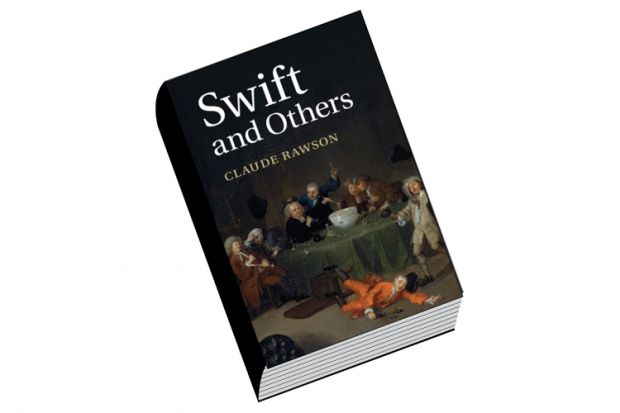Any collection of previously published essays raises the inevitable question: what holds the pieces together – aside from possible authorial vanity? A title such as Swift and Others could just as readily be cumulative as comparative, suggestive of the car-boot sale; but that is not at all the case with this carefully interwoven assemblage by a pre-eminent Swiftian.
Claude Rawson – a loyal alumnus of the “hard school” of Swift criticism, whose fellows include F. R. Leavis – offers significant insights into major works by Rochester, Dryden, Congreve, Pope, Mandeville, Fielding, Johnson, Gibbon, Austen (and even Norman Mailer), which he links via close comparative readings of the central paradoxes informing works such as Gulliver’s Travels and A Tale of a Tub.
Rejecting any attempt to de-claw the great tiger of English literature, the chapter on “Gibbon, Swift and irony” best illustrates features that distinguish Swift’s “unstable”, “negative”, “violent” irony, invariably employed to “betray” rather than befriend his readers. Rawson’s analyses are especially persuasive in reminding us of the “paradox…of an aggressively slippery identity of views between Swift and the things or people he rejects” that makes this religious and political conservative such a “radical satirist”. Unlike Gibbon’s irony, for example, more often the “Swiftian trap” allows for no “winners”.
Rather than the “more moderate and tolerant Swift” who emerged from 1950s criticism of Gulliver’s fourth voyage as a purported “Anglican Compromiser”, Rawson argues for “an imagination partly given over to that disruptiveness of the mind which he both anatomized and knew he shared, even as he wrote to exorcise it”. Rawson’s persuasive analysis of the Tale reveals a style “more receptive to instabilities and unpredictable disruptiveness, and correspondingly less charmed with Popeian assurance”. Nowhere is that disruptiveness better illustrated than in the excerpts Rawson cites from the Tale – in particular, the frequent “mock-editorial hiatus” throughout. In this regard, an unfortunate Swiftian influence may be Rawson’s own recurring disruptive practice of inserting lengthy quotations mid-sentence.
Samuel Johnson’s antipathy to Swift, with whom he shared “political opinions, and…underlying modes of thought”, Rawson attributes to Johnson’s discomfort with irony in general and Swift’s “ferocity” in particular. Examining Johnson’s assessments, positive and negative, of Swift’s life and writings, Rawson detects “over-determination” of the sort that suggests “a degree of self-implication” and “projection”, which he sees as “inverted self-identification”. Even without Swift, Rawson still manages to have fun with Johnson’s pudeur in response to sexual transgressions in Antony and Cleopatra, which caused him to dismiss Cleopatra’s “feminine arts” as “too low” and Antony as short on “pomp” and “tumidity” – “though evidently” (the hard school-boy Rawson cannot help adding) “capable of tumescence when occasion requires”.
In an unstable irony worthy of his subject, Rawson suggests that “it may be that Swift is best understood by those who dislike him” – a dislike obviously he does not share. He was perhaps thinking of one of Swift’s most quoted Thoughts on Various Subjects: “When a true Genius appears in the World, you may know him by this infallible Sign, that the Dunces are all in Confederacy against him.” As these erudite essays remind us, whether for or against him, Swift was a pervasive “animating presence” among writers from his day to ours.
Richard J. Larschan is emeritus professor of English, University of Massachusetts Dartmouth.
Swift and Others
By Claude Rawson
Cambridge University Press, 320pp, £55.00 and £19.99
ISBN 9781107034785, 7610125 and 9781316308691 (e-book)
Published 19 March 2015
Register to continue
Why register?
- Registration is free and only takes a moment
- Once registered, you can read 3 articles a month
- Sign up for our newsletter
Subscribe
Or subscribe for unlimited access to:
- Unlimited access to news, views, insights & reviews
- Digital editions
- Digital access to THE’s university and college rankings analysis
Already registered or a current subscriber? Login
